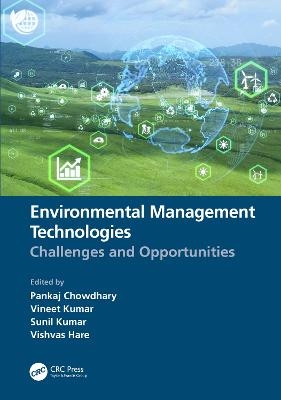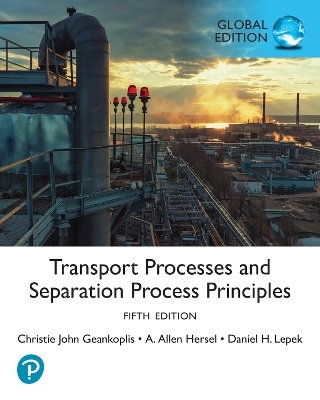
Environmental Management Technologies
Taylor & Francis Ltd (Verlag)
978-1-032-14563-1 (ISBN)
- Titel ist leider vergriffen;
keine Neuauflage - Artikel merken
Environmental Management Technologies: Challenges and Opportunities details the environmental problems posed by the various types of toxic organic and inorganic pollutants discharged from both natural and anthropogenic activities and their toxicological effects in environments, humans, animals, and plants. This book also highlights the recent advanced and innovative methods for the effective degradation and bioremediation of organic pollutants, heavy metals, dyes, etc. from the environment for sustainable development.
Features of the book:
· Provides state-of-the-art on the pollutants, its source and deleterious impact on the environment
· Elucidates the recent updates on Emerging pollutants (EPs) in pharmaceuticals waste and personal care products
· Discusses the various physico-chemical, biological and combination treatment systems for sustainable development
· Details recent research findings in the area of environmental wastes management and their future challenges and opportunities
Dr. Pankaj Chowdhary is Founder and President, Society for Green Environment (SGE) (www.sgeindia.org) at New Delhi India. Currently he is working as Postdoctoral Fellow in CSIR-Indian Institute of Toxicology Research. He received his Post-graduation degree (2011) in Biotechnology from Deen Dayal Upadhyaya Gorakhpur University Uttar Pradesh (UP), India. Afterward, he obtained his Ph.D. (2018) in the area of Microbiology from Department of Microbiology at Babasaheb Bhimrao Ambedkar University (A Central University), Lucknow, Uttar Pradesh, India. During Ph.D. his work has mainly focused on role of ligninolytic enzyme producing bacterial strains in the decolorizing & degradation of coloring compounds from distillery wastewater. His main research areas are Microbial Biotechnology, Biodegradation and Bioremediation of Environmental contaminants in Industrial wastewaters, Metagenomics, Biofuel, and Bioenergy production. He has edited three International Book “Emerging and Eco-friendly Approaches for Waste Management”, Contaminants and Clean Technologies, & “Microorganisms for Sustainable Environment and Health”. Besides, he has also authored two international books “New Technologies for Reclamation of Industrial Wastewater” & “Recent Advances in Distillery Waste Management for Environmental Safety”. He has published more than seventy (70) research publications including research/review papers and two book reviews in national and international peer reviewed journals of high impact factor published by Springer, Elsevier, Royal Society of Chemistry (RSC), Taylor & Francis Group and Frontiers. He has also published many National and International Book chapters & Magazine articles on the biodegradation and bioremediation of industrial pollutants. He has been presented many posters/papers relevant to his research areas in National and International conferences. He has been also served as a potential reviewer for various national and international journals in his respective areas of the research. He is a life member of the “Association of Microbiologists of India (AMI)”, “Indian Science Congress Association (ISCA) Kolkata, India” and The Biotech Research Society, India (BRSI). Dr. Vineet Kumar is currently working as a Senior Project Associate in the Waste Re-processing Division at CSIR-National Environmental Engineering Research Institute (NEERI), Nagpur, Maharashtra, India. Before his joining, he worked as Assistant Professor (Ad-hoc) in the Department of Botany at Guru Ghasidas Vishwavidyalaya, Bilaspur, India. He was anAssistant Professor and Academic Coordinator at Vinayak Vidyapeeth, Meerut, Uttar Pradesh. He received his M.Sc. and M.Phil. degree in Microbiology from Ch. Charan Singh University, Meerut, India.Subsequently, he earned his Ph.D. (2018) in Environmental Microbiology from Babasaheb Bhimrao Ambedkar (A Central) University, Lucknow, India. Dr. Kumar’s research interest includes: Bioremediation, Phytoremediation, Metagenomics, Wastewater Treatment, Environmental Monitoring, Waste Management; Bioenergy, and Biofuel Production. Currently, his research mainly focuses on the development of integrated and sustainable treatment techniques that can help in minimizing or eliminating hazardous waste in the environment. He has published 20 research articles in reputed International Journals, written 4 Proceeding Papers, 38 book chapters, and authored/edited over 14 books in the different aspects of Phytoremediation, Bioremediation, Wastewater Treatment, Omics, Genomics, and Metagenomics published by CRC Press (Taylor & Francis Group), Elsevier Science, Springer Nature, Wiley, Royal Society of Chemistry. His recently published book is ‘Recent Advances in Distillery Waste Management for Environmental Safety’ (From CRC Press; Taylor & Francis Group, USA). He has presented several papers relevant to his research areas at national and international conferences. He is an active member of numerous scientific societies including Microbiology Society, UK and Indian Science Congress Association, India. Dr. Kumar has been serving as a guest editor and reviewer in many prestigious International Journals, including Frontiers in Microbiology, Environmental Research, Chemosphere, Journal of Basic Microbiology; International Journal of Environmental Science and Technology; CLEAN-Soil, Air, Water, etc. He is the founder of Society for Green Environment, India (website: www.sgeindia.org). He can be reached at drvineet.micro@gmail.com. Dr. Sunil Kumar is a well-rounded researcher with more than 20 years of experience in leading, supervising and undertaking research in the broad field of environmental engineering and science with focus on Solid and Hazardous Waste Management. His primary area of expertise is solid waste management (Municipal Solid Waste, Electronic waste, Biomedical Waste etc.) over a wide range of environmental topics including contaminated sites, EIA, and wastewater treatment. He has contributed extensively to these fields and has citation of 8825, h-index of 44, and i10-index of 168 (Google scholar). His contributions since inception at CSIR-National Environmental Engineering Research Institute (NEERI), India in 2000 include 300 refereed journal publications, 05 books and 40 book chapters, 10 Edited volumes and numerous project reports to various governmental and private, local and International academic/research bodies. He is the Associate Editor of peer reviewed journals of the international repute i.e., Environmental Chemistry Letter, International Journal of Environmental Science & Technology, ASCE, Journal of Hazardous, Toxic and Radioactive Waste. He also serves as editorial board in Bioresource Technology, Elsevier. He has completed more than 22 research projects as PI with 17 (7 awarded) Ph. D. and 17 M. Phil/M. Tech thesis/dissertations under his supervision. The list of his collaborations is long and includes key Indian universities as IIT Kharagpur, IIT Delhi, and IIT Mumbai and prestigious regional institutes, such as Asian Institute of Technology (AIT) and Kasetsart University in Bangkok, Hong Baptist University, as well as universities in US (Columbia, Texas A&M), University of Calgary, Canada and Europe (UN University Dresden, and University of Uppsala, Sweden). He has contributed immensely to the advancement of environmental engineering/science fields in India in the region and internationally as anExpert committee member for revision of Solid Waste Management Rules, NGT members for Solid Waste Rules, organizing workshops/conferences and delivering invited speeches at both Indian and international Venues.Dr. Kumar has achieved recognition and awarded as Outstanding Scientist in 2011 and 2016 at CSIR-NEERI for his Scientific Excellence in the field of Research & Development in Solid Waste Management. Dr. Kumar was also awarded with the most prestigious award Alexander von Humboldt-Stiftung Jean-Paul-Str.12 D-53173 Bonn, Germany as a Senior Researcher for developing a Global Network and Excellence for more advanced research and technology innovation. Dr. Vishwas Hare is currently working as Vice-President in Society for Green Environment (SGE) at New Delhi. He obtained his Ph.D. (2018) in the area of Microbiology from Department of Environmental Microbiology at Babasaheb Bhimrao Ambedkar University (A Central University), Lucknow, Uttar Pradesh, India. He did his post graduation degree in Medical Microbiology from Choudhary Charan Singh University Meerut. His Ph.D. topic is “Studies on the Arsenic Affected Paddy Grown Area of Uttar Pradesh and its Remediation Approach” The main focus of his research work is the remediation of arsenic from paddy and other crop field. He has published many original research and review articles in peer reviewed journals of high impact. He has also published many International book chapters & a book review on the biodegradation and bioremediation of industrial pollutants. He has qualified ICAR NET in Microbiology and GATE in Life Science. He is also life member of the Academy of the Association of Microbiologists of India.
1. Physico-chemical technologies and their role/application in waste minimization. 2. Current technologies: Mitigation of tannery wastewater pollutants for sustainable development. 3. Recent advances in physico-chemical and biological techniques for the management of pulp and paper mill waste. 4. Conventional methodologies for the removal of wastewater their pros and cons.
5. Biochar: A sustainable tool for environmental management and toxicity remediation in affected soils. 6. Role of PGPR in bioremediation of environmental pollutants. 7. Wetland plants: An eco-friendly tools for the removal of various organic and inorganic pollutants from industrial wastewaters. 8. Microalgae: An emerging tools for the bioremediation of industrial pollutants and production of useful products. 9.Nanoparticles: A tool for removal/mitigation of various environmental pollutants for environmental safety. 10. Physicochemical and biological approaches: A comparative evaluation in waste minimization. 11. Role of ligninolytic enzymes in mitigation of industrial pollutants and their various application. 12. Genetically modified organisms as emerging tools for sustainable development and effective weapons for the removal of pollutants from contaminated environments. 13. Industrial wastewater pollutants, their endocrine disrupting properties and various removal approaches. 14. Distillery and Pulp & paper pollutants, their toxicity profile and removal strategies. 15.Agro-industrial waste a low cost adsorbent: Removal of fluoride for environmental safety. 16.Agro-industrial waste: Environmental concern and management. 17. Electronic waste: Hazardous effects on environments absent. 18.Microplastics: Sources, contaminants and management strategies. 19. Biphasic treatment system for the removal of toxic and hazards pollutants from industrial wastewaters. 20. Concluding remarks of emerging and eco-friendly approaches their future prospects for sustainable development.
| Erscheint lt. Verlag | 30.12.2022 |
|---|---|
| Zusatzinfo | 58 Tables, black and white; 4 Line drawings, black and white; 65 Halftones, black and white; 69 Illustrations, black and white |
| Verlagsort | London |
| Sprache | englisch |
| Maße | 178 x 254 mm |
| Themenwelt | Technik ► Umwelttechnik / Biotechnologie |
| Weitere Fachgebiete ► Land- / Forstwirtschaft / Fischerei | |
| ISBN-10 | 1-032-14563-3 / 1032145633 |
| ISBN-13 | 978-1-032-14563-1 / 9781032145631 |
| Zustand | Neuware |
| Haben Sie eine Frage zum Produkt? |
aus dem Bereich


